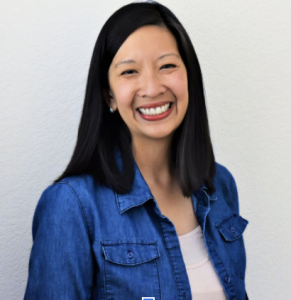We are celebrating Women in STEM this Women’s History Month. Stephanie Santoso shared her STEM story and thoughts about the future with us.

Tell us about your background.
Growing up, I always had an interest in science, more specifically marine biology, but I ended up majoring in Media Studies and Marketing in undergrad at the University of Virginia because I also developed a real interest in storytelling and communications. I ended up working in advertising for a few years and one of my clients was IBM. As result, I became really interested in how the technology the company was developing was helping organizations and companies develop new solutions, organize vast amounts of data and solve really important and complex problems. Eventually, I decided to go back to grad school at Syracuse University and when I did, decided to pursue a master’s in Information Management. While I was there, I became really interested in technology policy after having the chance to work on an NSF-funded project which looked at the social impact of using a technology that could be used for surveillance of activities on the Internet. This led me to pursue a Ph.D. in Information Science at Cornell, where I became an active part of the Maker community in Ithaca. I wanted to gain more real-world experience doing policy work and ended up interning at the White House Office of Science and Technology Policy internship program during the second year of my Ph.D. program during the Obama Administration. This was an incredible opportunity! I ended up working with an incredible team there to help launch and run President Obama’s Nation of Makers initiative to support the Maker Movement and engage more communities in supporting Makers and became the Senior Advisor for Making from 2014-2016.
What are you currently doing? How has your previous experience shaped you as a professional?
As the Director of Strategic Initiatives for the Makers + Mentors Network, a STEM initiative of the non-profit organization, Citizen Schools, I work with more than 20 communities across the U.S. to help them grow and deepen what they are doing around maker-centered learning opportunities which place mentorship as part of the learning experience. The organizations and institutions we work within these communities are specifically focused on serving underserved students and underrepresented students in STEM, including students of color, girls and young women, and neurodiverse students. I am also a Senior Program Fellow for Infosys Foundation USA, which focuses on engaging more students in Maker and Computer Science Education across the country.
Community, field, and network building have been at the heart of so many of my previous roles. These experiences have taught me the importance of developing strong relationships, which takes time, and how impactful it can be to bring together individuals and organizations that are doing really amazing work locally but may have never had a chance to connect before. That’s how new collaborations are formed and how important problems can be solved.
What have been some challenges you or other women you are familiar with face in the workforce?
As a relatively new mom and thinking back on this past year, I think the realities of balancing a career and having a family continues to be a significant challenge, even while many employers have adopted more accommodating policies. I’ve been very lucky in that we have family living nearby who have been able to step in and provide childcare so that both my husband and I could continue to work full-time during the pandemic, but I am very aware that for most women, this has not been the case. I have friends and colleagues with older children who made the decision to stay home full-time to help their kids navigate school remotely, knowing that this could have an impact on their careers. Pandemic or not, this shouldn’t be the case- women shouldn’t have to choose between having a career and having a family if they want both.
It’s 2050 and we are living in a more equitable world where the underrepresentation of girls in STEM is no more, describe what that looks like or the kinds of things that have happened to get us there.
We have made significant progress on some of society’s most pressing issues, whether that be climate change, racism, gun violence, or access to high-quality healthcare. This is because we know that highly diverse teams are more successful at solving problems.
